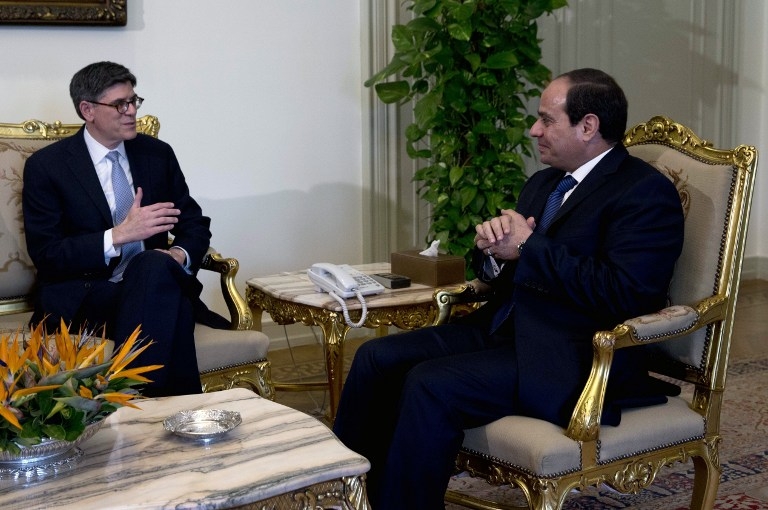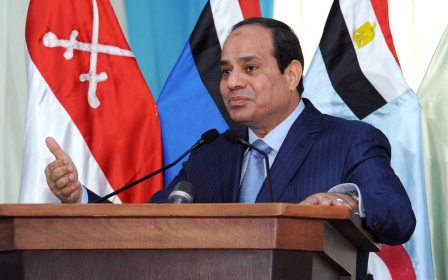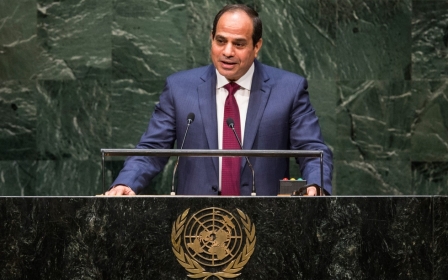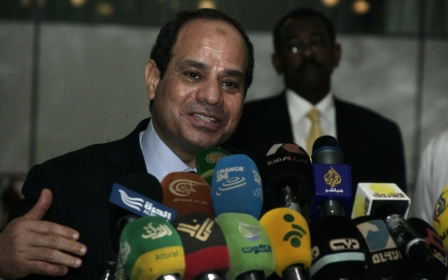Large US delegation explores Egypt trade ventures

A US trade delegation with representatives from 70 different companies met with Egyptian President Abdel Fatah al-Sisi on Tuesday, according to the New York-based Bloomberg news wire.
The mission, organised by the US Chamber of Commerce, is holding talks with officials in Cairo to explore trade and investment opportunities during its first visit since 2011.
The visit could be seen as a sign of mending rifts between the two countries after the US cut some of its annual $1.5 bn military aid budget to Egypt when the army takeover power in July 2013. Analysts now indicate that the initiative is a reflection of the growing positivity felt by the US, coming in the wake of a slowly improving economic picture and relative political stability, which has emerged in the wake of widespread crackdowns.
“Sisi enacted aggressive fiscal reforms which have been welcomed by investors across the board, foreign and local. It [the move] signalled that there is a government willing to deal with structural issues and press ahead with needed reforms,” said Mohamed Abu Basha, an economist at leading investment bank, EFG Hermes.
Sisi launched an economic development plan in June which aims to boost the economy by developing industry and agriculture and attracting direct investment. The plan enacted drastic cuts in fuel subsidies but has also seen the growth of several infrastructure and development projects, namely the Suez Canal project, the Dabaa nuclear plant, Emaar Square and a new roads network, Abu Basha added.
The country's economy has also been bolstered by billions of dollars’ worth of aid and loans, funnelled in by Saudi Arabia, the UAE and Kuwait.
Curt Ferguson, head of Coca-Cola Co.’s Middle East and North Africa division, who attended the meeting with Sisi, insisted that the talks were strictly about business.
“Politics were out of it,” Ferguson told Bloomberg. “Investors look at countries like a bank: you want stability, you want the ability to withdraw funds when you want to, you want to be able to get a return. We see that being enhanced” under Egypt’s current leadership, he explained.
The company started building a $122 mn juice factory on the outskirts of Cairo last month, part of a five-year plan to invest $500 mn in the expansion of its operations in Egypt, he said.
Sisi however took the opportunity to reassure the US business delegation that Egypt’s parliamentary elections will be held before the end of March 2015, his spokesman said on Tuesday.
Economic experts have said that while Egypt’s economy has suffered since the 2011 uprisings, foreign investment in Egypt has remained relatively stable, with recent economic indicators showing economic growth accelerating by 3.7 percent in the past three months and stocks surging more than 40 percent in the past year, according to data compiled by Bloomberg.
“Whoever was investing in Egypt [before 2011] has continued to invest in the country,” Abu Basha told MEE.
“If you have a look at various macro-indicators there are positive trends regarding foreign inflows into the stock market [which have increased] at levels and at a consistency that we haven’t seen since 2011,” he added.
But while indicators are positive, analysts remain sceptical of a serious shift in Egyptian economy, noting a need for further political stability in the country.
“The delegation is not coming to invest but to explore investment opportunities. They are coming because Egypt now has a story to tell after these reforms were enacted … [and] projects offered, which has partly encouraged such a delegation,” said Abu Basha.
Abu Basha believes, however, that it is still early to determine the extent and pace of foreign direct investment coming into Egypt following Sisi’s economic reforms as investors are awaiting the parliamentary elections and the international economic summit – to be held in March - for more clarification on Egypt’s political and economic stability.
Michael Hanna, a senior fellow at the Century Foundation, a US-based think tank, who said the mission reflects US efforts to bring ties back to normal, agrees that “it’s highly unlikely that this is a sustainable basis going forward,” he said.
Egypt wants to build a relationship “based on economic ties and is much less interested in other aspects,” he told Bloomberg by phone.
Investment Minister Ashraf Salman told the delegation that the government is working on laws to make it easier for companies to do business, while Mounir Fakhry Abdel Nour, the minister for industry and trade, said there’s a plan to liberalise electricity prices, according to the state-run Middle East News.
American policy towards Egypt has softened since Sisi’s inauguration as President earlier this year and amid US-led efforts to build a regional alliance against the Islamic State - which Sisi has vowed to join.
US Secretary of State John Kerry said during a visit to Cairo in June that full aid would resume soon and revealed - two weeks after former army chief Sisi was sworn in as president – that the US had released $575m in military aid to Egypt that had been frozen since the ousting of Egypt's first democratically elected President Mohammed Morsi last year.
His removal was followed by a widespread crackdown, which has seen tens of thousands of mainly Muslim Brotherhood supporters arrested and more than a 1,000 people killed by Egyptian security forces. Egypt's secular youth movement, as well as media freedoms in the country have also been hard hit.
The muted reconciliation comes despite a series of condemning statements made by the US delegation during last week’s United Nations Human Rights Council review of Egypt's human rights record.
During the 5 November Genevea review, US's UN Human Rights Council representative, Keith Harper said: "Steps taken by Egypt have resulted in violations of freedom of expression, peaceful assembly and association, deprived thousands of Egyptians of fair trial guarantees, and undermined civil society's role in the country.”
Harper also called for the release of political prisoners and urged Egypt to "investigate excessive use of force by security forces, publicly release findings, and prosecute those identified as being responsible."
According to Sarah Leah Whitson, director of the Middle East and North Africa at Human Rigths Watch, the US trade mission is “deeply troubling,” with Sisi seen to be blamed for the harshest crackdown on freedoms and political dissent in decades.
“The Egyptian government is desperate for just this kind of international pat on the back and it’s very eager to demonstrate that everything is back to normal in Egypt,” she said.
Egypt ranks third in Africa and 43rd worldwide for imports originating from the United States. The country's top imports from the US are oilseeds and grains, machinery and computers, mineral fuel, wax, and oil, according to the Office of US Trade Representative website.
The US exported $4.9 bn worth of goods to Egypt, during January-September 2014, according the American Chamber of Commerce in Egypt website.
New MEE newsletter: Jerusalem Dispatch
Sign up to get the latest insights and analysis on Israel-Palestine, alongside Turkey Unpacked and other MEE newsletters
Middle East Eye delivers independent and unrivalled coverage and analysis of the Middle East, North Africa and beyond. To learn more about republishing this content and the associated fees, please fill out this form. More about MEE can be found here.




